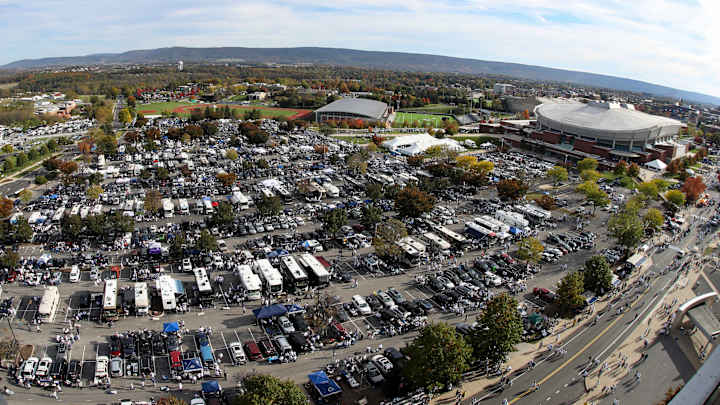Without Penn State Football This Fall, Centre County Braces for Change

At this point, Fritz Smith said, businesses in the Penn State region hope that Beaver Stadium can host football games during the spring semester and some fans with them. In fact, Smith said, "that's the best we can hope for."
"It would make for a very busy and kind of hectic spring if [football] does get pushed to spring," said Smith, president and CEO of the Happy Valley Adventure Bureau. "At this point, it's hunker down for our businesses to try to stay alive until then. It's going to be very, very tough for some of them."
Gauging the full economic impact of a fall without football in college towns like State College is difficult, though Smith said it obviously will be sizable. Smith estimated that COVID-19 already has resulted in a $100 million loss of visitor spending for the region in 2020.
A fall without Penn State football could add another $70-$80 million in losses, he said.
"It's going to be devastating, in a word," Smith said.
State College is known as the pastoral college town that effectively becomes Pennsylvania's third-largest city on home football weekends. Penn State football has averaged more than 700,000 fans annually for home games the past five seasons under head coach James Franklin, who is well aware of their economic impact.
Two years ago, Franklin even joked that he expected 110,000 fans in the stadium and another 100,000 outside tailgating for Penn State's annual 'White Out' game against Ohio State.
"There's always a concern about financial implications," Franklin said this spring. "As a football coach at Penn State, you always carry a little of that weight on your shoulders, that pressure on your shoulders, because you know that the success of football will rise all boats in the athletic department and obviously has an impact on the community. Everybody is aware of that and everybody is sensitive to that."
Sandy Barbour, Penn State vice president for intercollegiate athletics, estimated the impact of not playing football on the athletic department could reach $100 million. Penn State is asking donors to consider that effect when deciding how to address their 2020 season-ticket packages.
Barbour added that not having seven home games would be "really difficult" on State College.
"We also cannot ignore the impact this will have on our community at large, including our local businesses," Barbour said. "We have the greatest fans in all of college athletics and we know they will be the first ones cheering our teams on when we return to athletics. We also know our donors will continue to be a big reason why we can continue to support our student-athletes during this difficult time."
In State College, the lack of a fall football season continues a difficult year. Penn State closed its campus in March, in-person graduation ceremonies were not held and popular local events such as the Central Pennsylvania Festival of the Arts and 4th Fest were canceled.
Penn State also canceled its spring Blue-White football game, and dozens of regional sports camps and events were canceled as well. This spring, Centre County's hospitality industry had a 20.4 percent unemployment rate, Smith said. Without a fall football season, local hotels will go without 30-35 percent of their annual budgeted revenue, Smith estimated.
And even with about 65 percent of local restaurants open, Smith said that many are struggling with Pennsylvania's mandate limiting indoor dining to 25 percent of capacity.
"Some of them are pretty steadfast in saying that they just can’t operate under those restrictions," Smith said. "They can’t be profitable at 25 percent occupancy. ... Absent some of those [further] stimulus measures, we may see more empty storefronts than we're used to."
The Happy Valley Adventure Bureau, which markets the region's tourism destinations, had ambitious plans for 2020. Last year the bureau hired an outside marketing agency to develop a branding strategy designed to draw more visitors and businesses to Centre County.
The plan sought to reach, among others, college parents who leave after dropping off their kids and "work martyrs" in markets such as New York, Philadelphia and Washington, D.C., who feel guilty about taking longer vacations.
Another target audience was "lapsed PSU alumni who haven’t been back in a while because they think there’s nothing beyond campus, or who only come for football then head out Sunday morning," according to the HVAB marketing plan.
Because of the COVID-19 shutdown, Smith said, the HVAB has had to scale back those plans. The organization is funded by a county lodging tax, and local hotel revenue fell by 90 percent in April and May, Smith said.
Now, the HVAB is focusing its attention on the region's six state parks and its sense of being a "great place to get away from it all."
Still, Smith sees some hope with the potential for spring football, if it's played on college campuses. He said that Centre County would be willing to "make it work."
"There would be a curiosity factor," Smith said. "People would still want to come and see how it works, and there will be so much pent up demand by then that I think you’d still get the same crowds and it would still be a sellout, if that’s permitted. I do think it will work. I don’t like it as a permanent solution, but I think for one year it would be great."
Get the latest Penn State news by joining the community. Click "Follow" at the top right of our AllPennState page. Mobile users click the notification bell. And please follow AllPennState on Twitter @MarkWogenrich.

Mark Wogenrich is the editor and publisher of Penn State on SI, the site for Nittany Lions sports on the Sports Illustrated network. He has covered Penn State sports for more than two decades across three coaching staffs, three Rose Bowls and one College Football Playoff appearance.